Editorial
Dear EIBIR Partners, Colleagues and Friends,
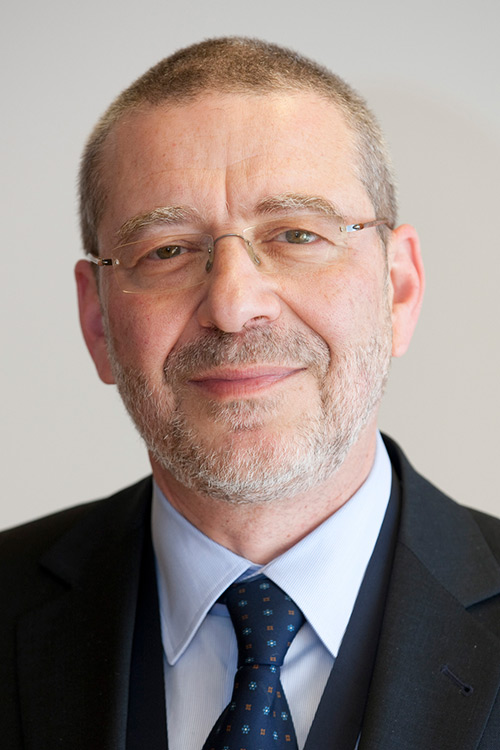 I am pleased to present the Annual Scientific Report of the European Institute for Biomedical Imaging Research (EIBIR) for the year 2020. Without any doubt, 2020 will remain in our memories as the year when the COVID-19 pandemic hit the world and changed our daily lives in so many ways. However, it was still a busy year for EIBIR, with several Horizon 2020 projects ongoing or concluding and four projects starting. The EIBIR team, again, successfully showed its immense experience and commitment despite the changed working conditions caused by the COVID-19 pandemic.
I am pleased to present the Annual Scientific Report of the European Institute for Biomedical Imaging Research (EIBIR) for the year 2020. Without any doubt, 2020 will remain in our memories as the year when the COVID-19 pandemic hit the world and changed our daily lives in so many ways. However, it was still a busy year for EIBIR, with several Horizon 2020 projects ongoing or concluding and four projects starting. The EIBIR team, again, successfully showed its immense experience and commitment despite the changed working conditions caused by the COVID-19 pandemic.
EIBIR has also made its contribution to combat the pandemic by offering its expertise in proposal preparation and project management free-of-charge to everyone applying for COVID-19 research funding. In addition, EIBIR launched an always up-to-date overview of COVID-19 imaging repositories and datasets. These are essential for diagnosis in radiology, as well as for the development of artificial intelligence (AI) tools for machine-based diagnosis. The list of open access COVID-19 repositories can also be used for teaching, training, and/or research.
EIBIR is currently involved in nine collaborative research projects funded under the Horizon 2020 Framework Programme, for which it leads project management and dissemination activities and, in the case of four projects, also acts as project coordinator. All these project proposals, ranging from developing ground-breaking imaging technologies to better understanding disease and radiation protection, benefitted from EIBIR’s support and this impressive track record shows just how much invaluable experience the EIBIR team has developed over its 14 years of operation. All projects will be presented in more detail in the further course of this report.
In 2020, the European Society of Radiology (ESR) in cooperation with EIBIR launched the “ESR Research Seed Grant Programme” to stimulate and provide funding for innovative one-year pilot studies. Eight projects were selected for this first round of funding all focusing on AI or cardiac imaging topics, which were the funding priorities in 2020.
EIBIR has been able to secure more than € 109 million in European research funding since 2006. I would like to take this opportunity to thank our shareholder organisations, industry partners, and members for their great support again in 2020. As a result of their continued commitment, EIBIR is able to offer proposal preparation and project management services to biomedical imaging researchers at a fraction of the cost charged by similar entities in the private sector. On behalf of the entire EIBIR team, I can say that we all look forward to seeing our partnership continue in 2021 and beyond, in addition to collaborating with you also under the new Horizon Europe programme.
This Annual Report provides an overview of our activities and achievements in 2020. I hope you enjoy reading the report and that it gives you a good impression of the work we do. If you also want to be a part of this success, I encourage you to contact us so we can assist you with submitting your research proposal and with becoming part of our network of scientific excellence.
Sincerely,

Gabriel Krestin
Our services
We offer expert support for proposal preparation, professional project management and communication and dissemination services for Horizon 2020 and other European funding schemes.
EIBIR strives to improve cooperation within the European biomedical imaging community, with the goal of improving the diagnosis, treatment and prevention of diseases. EIBIR actively supports research networking activities, common initiatives and interoperability in the field of biomedical imaging research. Over the last years, EIBIR has helped shape the landscape of European biomedical imaging research by supporting scientists and helping them secure funding for their projects.
High-level project management is required to ensure the successful accomplishment of every project’s goals. We offer expert advice, project management and coordination, communication and dissemination services for collaborative research projects and clinical studies. Our mission is to ensure optimal conditions for researchers to develop their dream projects by relieving them from all related administrative and management work.
EIBIR is an expert in developing competitive project proposals. The EIBIR team have a clear understanding of what the European Commission expects in each section of a research proposal. Therefore, EIBIR is a strong partner in all aspects related to writing a proposal for research funding, including assistance in drafting and finalising the budget.
One of the main advantages of working together with EIBIR is the opportunity to benefit from the expertise of our Scientific Advisory Board. It consists of 38 international experts from various specialties who can provide critical scientific feedback on your project ideas.
We also offer assistance in consortium formation and identifying suitable academic, industry or SME partners for your project.
Since 2006, EIBIR has helped to secure over €109,000,000 in research funding for biomedical imaging. This is testament to our effectiveness in promoting and supporting biomedical research.
Successful project management support
Once your research proposal has been granted, we offer professional project management and coordination, communication and exploitation services for your research projects and clinical studies.
EIBIR is a reliable partner in following the rules and regulations of Horizon 2020 and other funding schemes while making them more easily accessible and less burdensome and gives you space and time to focus on project’s success.
Save precious time
We are aware you already have many demands on your time. By assuming management and administrative responsibilities, we relieve you of these time-consuming tasks, allowing you to focus on your research instead.
| Service | Description |
| Proposal preparation support | Submission of project idea and pre-proposal check, consortium formation and communication, proposal writing and budget planning, document polishing & editing, submission to European Commission |
| Project management | Grant and consortium agreement preparations, regular European Commission project reporting, financial management of your project, communication and dissemination |
| EIBIR Electronic Data Capture Platform | The EIBIR Electronic Data Capture (EDC) Platform can be used to collect and manage almost any type of digital data that is part of your biomedical research — from numerical values or text, to DICOM images. |
| EIBIR Joint Initiatives | Participate in EIBIR’s interdisciplinary groups that work towards a biomedical imaging research goal or start a new joint initiative related to your field. |
| EIBIR Scientific Advisory Board | Have your institution represented on our Scientific Advisory Board and help shape the future of biomedical imaging research (candidates are subject to approval procedure by the current EIBIR shareholders before appointment). |
| EIBIR Dissemination Support | Send us updates and news from your research and we’ll share it via our online and social media channels. |
| EIBIR Members Bulletin | Regular updates on expected funding calls to give you a head start on your proposal preparation. This service gives our members an early indicator of the funding opportunities available to them, which also gives them a crucial advantage in proposal preparation. |
Flexible pricing
Our range of support services to research institutions can be accessed via three service package categories at affordable, flexible pricing. As a non-profit organisation, EIBIR aims to boost the success of biomedical imaging research in the European funding landscape by providing crucial support services.
To fully benefit from our services, you can become part of the EIBIR Network for a reasonable annual fee.
For proposal preparation only, we now offer alternative pricing options including a success fee of 1.5% of the total requested project budget. For more information on the available pricing options, please contact our office.
| Service package fee per calendar year institution | €1000 | €200 | €100 |
| EIBIR Proposal Preparation support, consortium building and project management (full proposals, stages 1 and 2) | ✓ | ||
| EIBIR Proposal Preparation support, consortium building and project management (first stage only) | ✓ | ✓ | |
| EIBIR Network Consortium Building | ✓ | ✓ | ✓ |
| EIBIR Electronic Data Capture Platform | ✓ | ✓ | |
| EIBIR Joint Initiatives | ✓ | ✓ | |
| EIBIR Scientific Advisory Board1 | ✓ | ✓ | |
| EIBIR Dissemination Support2 | ✓ | ✓ | ✓ |
| EIBIR Members Bulletin | ✓ | ✓ | ✓ |
| EIBIR Network Database | ✓ | ✓ | ✓ |
1Please note that this conditional on the approval of EIBIR’s shareholders
2Please note that EIBIR cannot guarantee that every update or news item sent to it can be published via its dissemination & communication channels.
About us
Combining the expertise of our scientific advisory board, advice from our multi-disciplinary shareholder groups, input from the European Society of Radiology Research Committee and recommendations from the industry panel, EIBIR benefits from the guidance and support of a multi-faceted organisational structure that ensures EIBIR and biomedical imaging are at the forefront of research activities in Europe.
You can read more about EIBIR and its structure here.
Scientific Advisory Board
Our Scientific Advisory Board (SAB) sets and guides EIBIR’s long-term strategy and goals for biomedical imaging research. It also provides invaluable expert advice and feedback to EU consultations and research proposals. In 2020, the SAB met twice to discuss EIBIR’s strategy for future research calls and to brainstorm on new ideas that can better serve researchers and further promote the role of biomedical imaging in European research.
Scientific Director
Gabriel P. Krestin is full professor of Radiology and Chairman of the Department of Radiology at Erasmus MC, University Medical Center Rotterdam, the Netherlands. His main areas of research are: imaging of abdominal organs and of cardiovascular diseases, molecular imaging and population imaging. He is a member of the recently established Scientific Panel for Health of the European Commission.
Shareholder representatives
Magdalena Rafecas– EFOMP
Karen Rosendahl – ESPR
Marc Dewey – ESR
Vincenzo Valentini– ESTRO
Casper Garos – COCIR
Jolanta Kunikowska – EANM
Jonathan McNulty – EFRS
Philippe Pereira – CIRSE
Daniel Pinto dos Santos– EuSoMII
Andrew Webb – ESMRMB
Marion Smits – EORTC
Ex officio member EFLM: Michael Neumaier
JI directors
Nandita de Souza – EIBALL
Christoph Hoeschen – EURAMED
Michal Neeman & Silvio Aime – Preclinical imaging
Wiro Niessen – AI for medical imaging
Karen Rosendahl – Paediatric radiology
Francesco Sardanelli – EuroAIM
Regular members
Thomas Beyer
Glenn Flux
Giovanni Frisoni
Xavier Golay
Horst Hahn
Myriam Hunink
Alexandre Krainik
Georg Langs
Luis Marti-Bonmati
Celso Matos
Konstantin Nikolaou
Anders Persson
Antonio Pifferi
Andrea Rockall
Steven Sourbron
Oliver Speck
Irene Virgolini
Shareholders
EIBIR’s shareholder organisations exemplify the importance of a multidisciplinary approach in biomedical imaging research. Their support is vital to EIBIR’s decision making.
 |
European Society of Radiology www.myesr.org |
 |
Cardiovascular and Interventional Radiological Society of Europe www.cirse.org |
 |
European Coordination Committee of the Radiological, Electro- medical and Healthcare IT Industry www.cocir.org |
 |
European Association of Nuclear Medicine www.eanm.org |
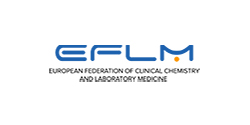 |
European Federation of Clinical Chemistry and Laboratory Medicine www.eflm.eu |
 |
European Federation of Organisations in Medical Physics www.efomp.org |
 |
European Federation of Radiographers Society www.efrs.eu |
 |
European Organisation for Research and Treatment of Cancer www.eortc.org |
 |
European Society of Paediatric Radiology www.espr.org |
 |
European Society for Magnetic Resonance in Medicine and Biology www.esmrmb.org |
 |
European Society of Medical Imaging Informatics www.eusomii.pro |
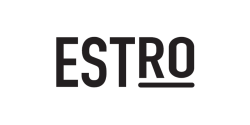 |
European Society for Radiotherapy and Oncology www.estro.org |
Industry panel
The Industry Panel allows EIBIR and its member industry organisations to identify shared interests and opportunities for collaboration.
The cost for membership packages ranges from €10,000 for Gold, €5,000 for Silver and €1,000 for SMEs. Industry Partners benefit from EIBIR services according to their varying financial commitment.
The long-standing commitment of EIBIR’s industry partners have allowed projects such as the MIPA study, and EIBIR looks forward to enhanced cooperation in the coming years.
Gold industry member
 |
 |
 |
SME industry members
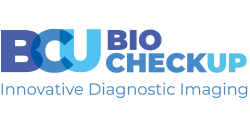 |
 |
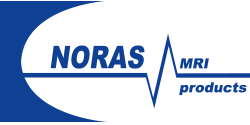 |
 |
 |
 |
EIBIR Team
We are a professional team with significant experience in the field of biomedical imaging research funding, extensive knowledge of the European Commission requirements and European research landscape.
 |
Mag. Monika Hierath
Executive Manager |
 |
Dr. Pamela Zolda
Project Manager |
 |
Peter Gordebeke, MSc
Project Manager |
 |
MMag. Katharina Krischak, BA
Project Manager |
 |
Ulrike Mayerhofer-Sebera, MSc
Project manager |
Our network
The EIBIR network is built upon the strength of its partners, and we would like to thank all organisations and individuals who have recognised the importance of becoming involved. Our Network is open to institutions from all disciplines with an interest in biomedical imaging and welcomes bottom-up initiatives and active involvement.
It represents 54 institutions from 19 countries and includes universities, research organisations, hospitals, large industry and SMEs active in a variety of different imaging-related fields.
| Network statistics as of 31/12/2020 | |
| Active service package | 26 |
| Regular service package | 25 |
| Associate service package | 3 |
| Total | 54 |
Joint Initiatives
EIBIR supports Joint Initiatives (JI) in setting up a new research- oriented community of scientists. The
EIBIR JIs represent interdisciplinary groups working towards a common bioimaging-focused research goal strengthen the JI’s specific research area.
In 2020, EIBIR supported six JIs with specific activities, including the coordination of collaborative research efforts, communication and dissemination of research results or announcements, and the organisation of workshops, meetings and training.
- AI for medical imaging
- Preclinical imaging
- European Network for the Assessment of Imaging in Medicine (EuroAIM)
- European Alliance for Medical Radiation Protection Research (EURAMED)
- European Imaging Biomarker Alliance (EIBALL)
- Paediatric Radiology
2020 saw the launch of the JI “AI for medical imaging” that aims to create an environment and infrastructure that allows to strengthen AI research in medical imaging and its translation to clinical research and clinical practice. More than 30 stakeholders from the EIBIR network followed our invitation and attended the online kick off meeting on March 13, 2020. The lively discussion embraced imaging repositories for AI development, challenges for AI validation, education and training, summer schools and applications for research funding. Activities will continue in the coming years.
START YOUR OWN JOINT INITIATIVE
To start a JI within EIBIR, a written concept describing the group’s aims, goals and mission is to be presented to our Scientific Director. It should include the name of the future Director of the JI, potential members and ideas for activities for the coming year.
The application will be reviewed by the Scientific Director and the EIBIR Scientific Advisory Board (SAB). After positive feedback from the Scientific Director and the SAB, the JI and its Director have to be formally appointed by the EIBIR shareholders during the annual EIBIR General Meeting, normally held on the occasion of the annual European Congress of Radiology.
The JI Director becomes an ex officio member of the EIBIR SAB. During meetings of the SAB, the JI Director reports on the JIs activities and presents the strategic goals for the upcoming year(s).
Following formal establishment, the JI Director invites potential members of the JI. We can help you in advertising the new JI by sending out information in our newsletters and distributing it to our shareholders. The overall goals and aims are consolidated in a kick-off meeting of the JI, in which the strategic course of action and responsibilities of the JI Director and JI members are defined.
EIBIR will offer administrative support to the JI Director, however, there is no additional financial support available for the directors or members unless provided within specific projects. All JIs will benefit through the EIBIR networking opportunities and collaboration in research projects.
EURAMED
EURAMED led the successful submission of a proposal addressing the Horizon2020 NFRP-13 call “Research roadmap for medical applications of ionising radiation” in September 2019 and was just recently invited to the Grant Agreement negotiations. The project consortium comprises a group of 29 partners including major universities and research centres in the field. The 3-year ‘EURAMED rocc-n-roll’ project will seek to establish an integrated and coordinated European approach to research and innovation for medical applications of ionising radiation and related RP, based on stakeholder consensus and existing activities in the field.
EURAMED also contributed to EJP-CONCERT (European Joint Programme for the Integration of RP Research) activities, in particular to the deliverable 3.7 (Second joint roadmap for radiation protection research).
MEENAS, an umbrella structure for European radiation protection (RP) research was established with the signature of a memorandum of understanding (MoU) in 2020. MEENAS members are MELODI, EURADOS, EURAMED, NERIS, ALLIANCE, and SHARE. Among others, MEENAS aims at promoting European RP research, developing and implementing a joint roadmap, identifying gaps of joint interest with respect to RTD needs for improving RP and to avoid duplication of efforts, supporting the development of a long-term joint research agenda for European RP research and promote scientific excellence, initiating and supporting the exchange with the wider research community and stakeholders, and optimising and coordinating the communication and dissemination of scientific knowledge resulting from RP research. In the second half of 2020, MEENAS prepared a vision document for a European Partnership for Radiation Protection Research under Horizon Europe.
EuroAIM
The EuroAIM initiative to assess the quality of medical imaging guidelines by using the Appraisal of Guidelines for Research and Evaluation (AGREE) II instrument continued throughout 2020. This endeavor is possible thanks to the close cooperation of the Subspecialty Societies of the European Society of Radiology. Critical appraisals of papers reporting recommendation on sarcopenia, of the quality of (18)F-FDG PET/CT guidelines in oncology, of the quality of guidelines for radiation protection in interventional radiology and of the quality of vertigo practice guidelines were carried out and related publications prepared. Find an overview of all publications related to this initiative on the EIBIR website.
Highlights of 2020
We look back on another successful year, opening new perspectives in the field of biomedical imaging research.
European Congress of Radiology 2020
In 2020 EIBIR held a Coffee and Talk Session dedicated to Artificial intelligence and European funding opportunities during the ECR 2020 Online Highlight Week on Artificial Intelligence. The Session ‘Artificial intelligence (AI) and the future of imaging: European funding prospects` took place on July 21st, 2020, and featured speakers from the EIBIR network. Georg Langs from the Medical University Vienna, Austria moderated the session and presented deep learning in imaging and cancer care. Wiro Niessen from Erasmus MC, Netherlands informed about the importance of artificial intelligence in imaging research, and Angel Alberich-Bayarri from QUIBIM, ES spoke about the application of artificial intelligence for biomarker discovery. Pamela Zolda from the EIBIR team informed about funding opportunities and proposal support services for researchers. The lively discussion between speakers and attendees showed a broad interest in all presented topics.
EIBIR at ECR 2021
During ECR 2021, EIBIR will host a special Coffee & Talk Session titled “Innovations in breast imaging: keys to funding success” on Saturday March 6, 15:30 CET. The session will introduce innovative breast cancer imaging research and also present EIBIR`s services and EU funding opportunities. The session is chaired by our Scientific Director Prof. Gabriel P. Krestin.
Programme:
- Innovation in the diagnosis of breast cancer using ultrasound and diffuse optics (Pietro Panizza; Milan/IT)
- Digital hybrid breast PET/MRI for enhanced diagnosis of breast cancer (Thomas H. Helbich; Vienna/AT)
- The impact of breast MRI on surgical planning and reoperation rate (Francesco Sardanelli; San Donato Milanese/IT)
- Funding opportunities under Horizon Europe (Peter Gordebeke; Vienna/AT)
- EIBIR’s support services: key for funding success (Pamela Zolda; Vienna/AT)
- Live Q&A
We look forward to your participation in ECR 2021!
Four new Horizon 2020 projects
 We’re proud to report that four new Horizon 2020 projects with a strong focus on medical imaging kicked off in September and October 2020.
We’re proud to report that four new Horizon 2020 projects with a strong focus on medical imaging kicked off in September and October 2020.
CHAIMELEON
CHAIMELEON aims to set up a structured repository for health imaging data to be reused in AI experimentation for cancer management. An EU-wide repository will be built as a distributed infrastructure in full compliance with legal and ethics regulations in the involved countries. It will build on partner ́s experience, and clinical partners and external collaborators will populate the repository with multimodality imaging and related clinical data for historic and newly diagnosed lung, prostate and colorectal cancer patients.
A multimodal analytical data engine will facilitate to interpret, extract and exploit the right information stored at the repository. An ambitious development and implementation of AI-powered pipelines will enable advancement towards automating data deidentification, curation, annotation, integrity securing and images harmonisation, the latest being of the highest importance for enabling reproducibility of Radiomics when using large multiscanner/multicentre image datasets.
The usability and performance of the repository as a tool fostering AI experimentation will be validated. A set of selected AI tools will undergo early in silico validation in observational clinical studies coordinated by leading experts in Gustave Roussy (lung cancer), San Donato (breast), Sapienza (colorectal) and LaFe (prostate) hospitals. Their performance will be assessed on hallmark clinical decisions in response to some of the currently most important clinical endpoints in cancer
EURAMED rocc-n-roll
The EURAMED rocc-n-roll project aims to propose an integrated and coordinated European approach to research and innovation in medical applications of ionising radiation and related radiation protection based on stakeholder consensus and existing activities in the field (incl. existing SRAs of radiation protection platforms, EC health and digitisation programmes, EURATOM-funded projects, SAMIRA initiative). To achieve this, research and radiation protection needs in the clinical disciplines using ionising radiation will be analysed with the aim to generate the largest benefit for the European population in an equal, safe, high-quality way throughout Europe, by fostering clinical translation, while at the same time strengthening economic growth and industrial competitiveness, supported by research and innovation in the field.
Representation of relevant radiation protection disciplines like radiation biology, dosimetry for medical applications, ethics as well as clinical expertise in the fields of radiology, nuclear medicine, radiation therapy, oncology, cardiovascular diseases, neurology, paediatrics complemented by regulatory and health policy, AI and industry experts in the consortium will ensure a fully integrative approach and allow embedding the project work into a broader framework of quality and safety in healthcare. Based on wide stakeholder input and consultation on the above aspects, EURAMED rock-n-roll will produce a strategic research for medical applications of ionising radiation and related radiation protection and a corresponding roadmap, as well as an interlinked document, integrating the views and identifying synergies from the areas of radiation protection, health research and digital, with impactful guidance to the EC and stakeholders on future research in this area. This will be accompanied by proposed and tested education and training schemes for the health workforce and scientists to increase Europe’s research capacity in the field.
SINFONIA
Reinforced risk appraisal of medical exposure is needed due to the extensive use of ionizing radiation for diagnosis and therapy. The main objective of the SINFONIA project is to develop novel methodologies and tools that will provide a comprehensive risk appraisal for detrimental effects of radiation exposure on patients, workers, carers and comforters, the public and the environment during the management of patients suspected or diagnosed with lymphoma and brain tumours.
The scientific work will (1) develop novel AI-powered personalised dosimetry and risk appraisal methods and tools to estimate the radiation burden on patients undergoing state-of-the-art radiological, nuclear medicine and radiation therapy procedures, (2) reinforce risk appraisal for exposed staff, comforters, the public and the environment during nuclear medicine and proton therapy procedures, (3) determine the degree of patient variability in radiation sensitivity for the risk of developing secondary malignancies and (4) design and develop data management techniques for managing data from imaging and non-imaging examinations and radiation therapy sessions. A data repository will be developed for storing data as well as for the deployment of AI algorithms on an online platform.
SINFONIA research outcomes for the two clinical examples, lymphoma and brain tumours, will be also applicable to other diseases. AI-powered personalised dosimetry tools will provide advanced knowledge on parameters affecting radiation detriment. This will help to balance the risks and benefits of ionising radiation procedures and developing dose optimisation strategies. Additionally, radiation biology studies will identify individuals with increased susceptibility of developing cancer from ionising radiation exposure. SINFONIA also will organise high-level multidisciplinary training in the field of radiation dosimetry, risk appraisal and radiation protection and develop recommendations on radiological protection.
EuCanImage
The goal of EuCanImage is to build a highly secure, federated and large-scale European cancer imaging platform, with capabilities that will greatly enhance the potential of artificial intelligence (AI) in oncology. Firstly, the EuCanImage platform will be populated with a completely new data resource totaling over 25,000 single subjects, which will allow investigating unmet clinical needs like never before, such as for the detection of small liver lesions and metastases of colorectal cancer, or for estimating molecular subtypes of breast tumours and pathological complete response.
Secondly, the cancer imaging platform, built by leveraging the well-established Euro-Bioimaging infrastructure, will be cross-linked to biological and health repositories through the European Genome-phenome Archive, allowing the development of multi-scale AI solutions that integrate organ-level, molecular and other clinical predictors into dense patient-specific cancer fingerprints.
To deliver this platform, the consortium will build upon several key European initiatives in data sharing for personalised medicine research, including EUCANCAn (cancer genomics and health data sharing), euCanSHare (cardiac imaging and omics data sharing) and EUCAN-Connect (federated data analytics). Furthermore, to foster international cooperation and leverage existing success stories, the consortium comprises the coordinators of The Cancer Imaging Archive (TCIA), the US cancer imaging repository funded by the National Cancer Institute. This will allow EuCanImage to leverage a unique 10-year long experience in cancer imaging storage, anonymisation, curation and management. Finally, a close collaboration between world-renowned clinical, radiomics, AI and legal experts within the consortium and beyond will establish well-needed guidelines for AI development and validation named FUTURE, for delivering Fair, Universal, Traceable, Usable, Robust and Explainable decision support systems for future cancer care.
ESR Research Seed Grants
Together with the European Society of Radiology (ESR), EIBIR launched a new seed funding programme for innovative one-year projects and pilot studies.
In 2020, the first recipient of the ESR Research Seed Grant were selected. The ESR Research Seed Grant is a new seed funding programme for innovative one-year projects and pilot studies launched by EIBIR together with the European Society of Radiology (ESR). The purpose of the programme is to stimulate and provide finding for ambitious projects that will subsequently lead to larger studies and further funding applications.
The funding priorities 2020 were Artificial Intelligence and Cardiac Imaging. 44 applications were received and reviewed by an international panel of experts. 8 projects were subsequently selected for funding. The project results will be presented at a dedicated session at ECR 2021.
Artificial Intelligence
- Integration of a Retina U-Net algorithm for the automated detection of primary lung cancer in clinical workflows
Thomas Weikert
Clinic of Radiology and Nuclear Medicine, University Hospital Basel, Basel/CH
- CT-based radiomics analysis in patients with intraductal papillary mucinous neoplasm (IPMN) of the pancreas
David Tobaly
Department of Radiology, Hôpital Beaujon, Clichy/FR
- RISK – Risk Maps using T2 mapping and Diffusion MR Sequences of the Prostate
Liliana Caldeira
Department of Radiology, University Hospital Cologne, Cologne/DE
- AI-driven MR-based imaging of tumor hypoxia
Ieva Kurilova
Department of Radiology, Netherlands Cancer Institute – Antoni van Leeuwenhoek, Amsterdam/NL
Cardiac Imaging
- MRI-assessed myocardial deformation of the systemic right ventricle in patients with transposition of the great arteries
Maja Hrabak Paar
Department of Diagnostic and Interventional Radiology, University Hospital Center Zagreb, Zagreb/HR
- Spatio-temporal cardiac motion patterns in the non-invasive diagnosis of myocarditis.
Fabian Laqua
Institute for Diagnostic Radiology and Neuroradiology, University Medicine Greifswald, Greifswald/DE
- Optimization and validation of highly accelerated compressed sensing whole-heart 4D-Flow imaging
Clemens Reiter
Department of Radiology, Medical University Graz, Graz/AT
- Reliability of cardiothoracic ratio as an estimate of cardiac enlargement compared to gold standard MRI parameters
Monika Arzanauskaite
Department of Radiology, Liverpool Heart and Chest Hospital, Liverpool/UK
Towards Horizon Europe: the new EU research and innovation programme
Horizon Europe will be the largest transnational programme ever supporting research and innovation. It runs from 2021 to 2027 and has a budget of €95.5 billion, which represents a 30% increase to the previous research and innovation programme, Horizon 2020. In 2020 the EIBIR team in collaboration with its Shareholders, Industry Partners and Scientific Advisory Board actively participated in the shaping process of Horizon Europe work programmes relevant to the biomedical imaging community. In August 2020 comprehensive feedback on the HEALTH work programme draft was provided to the National Contact Point for HEALTH. This feedback aimed at the further inclusion of imaging topics in research calls and highlighted, how imaging will contribute to the defined research questions. In September 2020 EIBIR in collaboration with the ESR submitted imaging priorities for the Horizon Europe Health Public-Private Partnership work programme to the Industry Board partner COCIR, who is one of the key players in the development of this programme.
We are looking forward to the official launch of Horizon Europe calls in April 2021 and the collaboration in dedicated grant applications!
Imaging Biobank Catalogue
Together with ESR experts, EIBIR continued to work on a catalogue describing image collections available for use in research.
During 2020, the technical aspects, as well as the database hierarchy and structure were finalised. Towards the end of the year, initial testing of the imaging biobank catalogue began internally. Following successful internal tests, invitations to selected external experts were extended to continue testing and population the imaging biobank catalogue.
EIBIR and the ESR hope that the imaging biobank catalogue can officially launch during the first half of 2021, with more database and biobank managers being invited to contribute metadata about their imaging collections.
Our projects
We are proud to support more than 220 partners from over 30 countries researching various forms of cancer and neurological disorders, and developing novel imaging technologies.
The HYPMED project
Digital Hybrid Breast PET/MRI for Enhanced Diagnosis of Breast Cancer
 Our EU-funded collaborative project HYPMED aims to develop a new hybrid PET/MRI technology to improve the detection and diagnosis of breast cancer at significantly lower radiation dose.
Our EU-funded collaborative project HYPMED aims to develop a new hybrid PET/MRI technology to improve the detection and diagnosis of breast cancer at significantly lower radiation dose.
The international consortium of academic and industry partners is designing, building and testing a PET insert with an integrated radiofrequency (RF) coil that can be utilised with any MRI machine to enable high-resolution PET/MRI imaging. EIBIR acts as the project coordinator and runs project management and dissemination activities.
In 2020 significant progress on the mechanical side was made and the final steps in the integration, functional testing, and physical characterization of the device will start soon. The electronics that need to be integrated into the device is close to finalization and everything is in place for a fast and effective integration phase. EIBIR acts as the project coordinator and runs project management and dissemination activities.
More information on the project is available here and at www.hypmed.eu.
The HYPMED project has received €5,861,957.50 funding from the European Union‘s Horizon 2020 research and innovation programme under grant agreement No. 667211 and is active until December 31, 2019.
The MEDIRAD project
Implications of Medical Low Dose Radiation Exposure
 The four-year MEDIRAD project aims to enhance the scientific bases and clinical practice of radiation protection in the medical field and thereby addresses the need to better understand and evaluate the health effects of low-dose ionising radiation exposure from diagnostic and therapeutic imaging and from off-target effects in radiotherapy.
The four-year MEDIRAD project aims to enhance the scientific bases and clinical practice of radiation protection in the medical field and thereby addresses the need to better understand and evaluate the health effects of low-dose ionising radiation exposure from diagnostic and therapeutic imaging and from off-target effects in radiotherapy.
The MEDIRAD project is close to completing its third year and was recently granted a 9-month cost-neutral extension by the European Commission, with a new conclusion date of February 2022. Several major milestones have recently been achieved, including the setup and testing of a central DICOM repository for dosimetry, imaging meta-data, and biobanking. Data collection efforts for the first-ever establishment of European DRLs for specific applications of CT in nuclear medicine have also just been finalised. Moreover, the assessment of low dose radiation exposure from I-131 radioiodine ablation therapy of thyroid cancer is in full swing, laying the foundation for the first epidemiological investigations within nuclear medicine.
MEDIRAD has also significantly progressed towards improving the understanding of low-dose ionising radiation risks associated with major medical radiation procedures, by combining for the first time, clinical and preclinical studies to get further insight into the biological mechanisms and biomarkers that may play a role in the development and prediction of cardiac complications, and to use these insights for the development of predictive models. The clinical studies EARLY-HEART and BRACE are thus close to completion. Furthermore, the pre-clinical studies to identify mechanisms of radiation-induced cardiovascular toxicity are ongoing.
The first-ever nested case control study in a cohort of CT-scan exposed individuals, commenced its study into the long-term effects of the associated low doses on cancer risks in children. In this study, the interaction between genetic and epigenetic factors along with radiation dosage on cancer risk will be assessed, with the results having the potential to significantly impact the medical radiation protection field at large.
In addition, the stakeholder forum and a consensus building infrastructure for the development of the recommendations – based on the scientific evidence emerging from MEDIRAD’s research results – have been established, and work on the recommendations has started with the aim to enhance medical radiation protection in Europe. The MEDIRAD project is thus well on track in its stated goals to significantly enhance the scientific bases and clinical practice of radiation protection in the medical field.
More information on MEDIRAD is available here and on www.medirad-project.eu.
MEDIRAD project has received €9,995,145.75 in funding from the Euratom research and training programme 2014- 2018 under grant agreement No. 755523 and is active until November 30, 2020.
The CoSTREAM project
Common Mechanisms and Pathways in Stroke and Alzheimer’s Disease
 The Common mechanisms and pathways in stroke and Alzheimer’s disease (CoSTREAM) project aims to improve our understanding of the co-occurrence of stroke and Alzheimer’s disease.
The Common mechanisms and pathways in stroke and Alzheimer’s disease (CoSTREAM) project aims to improve our understanding of the co-occurrence of stroke and Alzheimer’s disease.
The project builds upon extensive sets of longitudinal follow-up studies spanning up to 25 years. These studies include data on both diseases as separate clinical outcomes and contain information on genetics and metabolomics to brain structure assessed by imaging, and cognition. An essential concept of the project is that stroke and Alzheimer’s disease are sequential diseases with overlapping pathophysiological mechanisms and shared risk factors. The project focuses particularly on finding common mechanisms to reveal when and how these diverge to cause either stroke, Alzheimer’s disease, or both.
Major progress has been achieved in genetics and metabolomics analyses, finding candidate genes and metabolites causing either disease or acting as a link between them. Effects of compensatory mechanisms were studied using epidemiological research. Imaging studies revealed and validated the conclusion that amyloid and the volume of particular brain regions can be predictors of disease pathology and may be suitable for risk prediction. Finally, an in vitro cell culture model which co-cultures endothelial cells neurons, astrocytes, and pericytes to for a functional model of the neurovascular unit and the blood-brain barrier has successfully been developed.
The project is currently completing its final imaging study and working on the development of a combined risk score calculator.
More information on the CoSTREAM project is available here or on www.costream.eu.
The CoSTREAM project has received €5,100,372.50 in funding from the European Union‘s Horizon 2020 research and innovation programme under grant agreement No. 667375 and is active until 31 May, 2021.
The GLINT project
GlucoCEST Imaging in Neoplastic Tumours
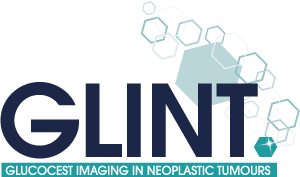 The EIBIR-supported GlucoCEST Imaging in Neoplastic Tumours (GLINT) project led by Prof. Xavier Golay from UCL (London/UK) was successfully concluded in December 2019. This ambitious project focused on developing a new, non-invasive MRI method using native D-glucose and 3-O-methyl-Dglucose (3OMG) as non-radioactive tracers to assess cancer glucose uptake and metabolism.
The EIBIR-supported GlucoCEST Imaging in Neoplastic Tumours (GLINT) project led by Prof. Xavier Golay from UCL (London/UK) was successfully concluded in December 2019. This ambitious project focused on developing a new, non-invasive MRI method using native D-glucose and 3-O-methyl-Dglucose (3OMG) as non-radioactive tracers to assess cancer glucose uptake and metabolism.
Over the past four years, GLINT compiled crucial new knowledge about the glucoCEST technique. Among others, the project partners improved the analytical equations of CEST quantification, which allow more accurate exchange rate determination of the glucoCEST signal. A new data acquisition technique called snapshot-CEST was developed for fast and robust volumetric CEST imaging and a complete post-processing software suite for analysis of general CEST experiments was developed by one of the non-academic partners and will be available soon to the whole MRI community.
The GLINT consortium evaluated the glucoCEST technique in terms of repeatability and reproducibility in a multicentre study, which demonstrated that the method was robust enough to detect the small signal changes expected in vivo at clinical field strengths. Furthermore, the project partners showed that it was possible to detect a positive glucoCEST signal in glioma patients, while detection of such a signal in solid tumours remains elusive at this stage. Other deliverables of the project included a radiometric approach for accurate estimation of pH change and, using CEST-pH imaging, the partners were able to detect in vivo changes in tumour acidosis. Moreover, research on glucose analogues demonstrated the ability to image tumours by many new possible contrast agents, from 3OMG and other non-metabolizable glucose analogues, to glucosamine (GlcN) or N-acetyl-glucosamine (GlcNAc) CEST MRI in animal models. Generally, images produced using these analogues at high field strength corresponded well to FDG-PET.
More information about the project is available here and on www.glint-project.eu.
The GLINT project has received €6,454,612 in funding from the European Union‘s Horizon 2020 research and innovation programme under grant agreement No. 667510 and concluded on December 31, 2019.
The LUCA project
Laser and Ultrasound Co-Analyzer for Thyroid Nodules
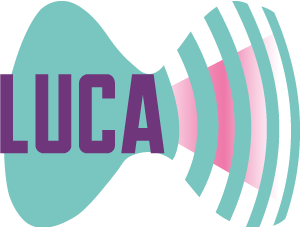
The EU-funded Laser and Ultrasound Co-Analyzer for Thyroid Nodules (LUCA) project has developed a multi-modal platform consisting of a device, a probe, and algorithms to enable more specific and more accurate thyroid nodule diagnosis. The LUCA device combines two photonics systems, near-infrared diffuse correlation spectroscopy and time-resolved spectroscopy, which allow for the non-invasive measurement of the hemodynamics, collagen, water, lipid, and tissue structure alongside traditional ultrasound screen procedure. Increasing the sensitivity and specificity of the screening process is of major importance as current methods lead to a large number of non-diagnostic and/or false positive biopsy results (about 750,000/year in Europe), resulting in about 150,000 unnecessary surgeries in Europe each year.
In 2020, LUCA entered its final phase focussing on upgrades, final tests, and the validation of the device in real-world settings. However, due to the COVID-19 pandemic, the clinical study was halted for large parts of 2020 and only resumed at the end of the year. To ensure the study can be concluded, the project received another extension from the European Commission and will now end in May 2021.
Major results of the project were presented at the LUCA online conference “Synergy of light & sound for disease screening and therapy monitoring” in November 2020. The talks of the conference are available online.
More information on the LUCA project is available here and on www.luca-project.eu, or watch the LUCA videos.
The LUCA project is an initiative of the Photonics Public Private Partnership, and has received €3,628,845.75 in funding from the European Union‘s Horizon 2020 research and innovation programme under grant agreement No. 688303 and is active until January 31, 2020.
The SOLUS project
Smart Optical and Ultrasound Diagnostics of Breast Cancer
The SOL US project is developing a new hybrid imaging system that can detect and classify breast lesions in a non-invasive manner. This system offers a significant improvement in the ability to differentiate between benign and malignant tumours over current imaging systems. Similarly to thyroid nodule screening, invasive procedures, such as biopsies, are currently carried out in an unnecessarily high number of cases. SOLUS can help avoid such unnecessary biopsies in breast cancer screening by improving the characterisation of lesions in the breast.
US project is developing a new hybrid imaging system that can detect and classify breast lesions in a non-invasive manner. This system offers a significant improvement in the ability to differentiate between benign and malignant tumours over current imaging systems. Similarly to thyroid nodule screening, invasive procedures, such as biopsies, are currently carried out in an unnecessarily high number of cases. SOLUS can help avoid such unnecessary biopsies in breast cancer screening by improving the characterisation of lesions in the breast.
The innovative, multi-modal tomographic system that SOLUS is developing combines diffuse optical tomography and ultrasound/shear wave elastography to support the in vivo diagnosis of breast cancer. This will achieve a substantially improved in-depth diagnosis of breast lesions with higher specificity, as well as more effective treatment of breast cancer than conventional ultrasound or MRI imaging.
The SOLUS project entered its final year. The novel components and subunits for the SOLUS system prototype have been integrated into a smart optode for optical tomography measurements. This smart optode is combined with a regular ultrasound probe to form the multimodal probe of the device, which is still being completed and integrated into the full system. Calibration and technical validation efforts have also been started.
A pilot clinical study will start in Summer 2021.
More information on SOLUS is available here and on www.solus-project.eu.
The SOLUS project is an initiative of the Photonics Public Private Partnership. This project has received €3,815,260 in funding from the European Union’s Horizon 2020 research and innovation programme under grant agreement No. 731877 and is active until October 31, 2021.
The AlternativesToGd project
Hyperpolarised MR technologies and molecular probes as alternatives for conventional metal-containing contrast agents for MRI examinations

The 4-year AlternativesToGd project will identify and validate radically new compounds and technologies as alternatives to conventional gadolinium-bearing contrast agents (GBCAs) for medical imaging. The consortium will develop a new class of contrast agents that will be metal-free, safe, and fully eliminated from the human body. The compounds and technologies will be tested in animal models of disease and the most promising ones will be selected for further clinical development. In 2020 new protocols for the polarization of water were developed and optimized. Nanocapsules in D2O have been synthesized and characterized. Parahydrogen based hyperpolarization has been applied to [1-13C] acetate derivatives, to obtain 13C hyperpolarized acetate by means of the PHIP-SAH method.
Novel multi-nuclei transmit and receive coils were conceptualized and first prototypes were built. Initial MR data could be obtained on a clinical scanner with an independent receive system, thus proving the feasibility of interfacing independent spectrometer to clinical scanners.
EIBIR, the project management partner, facilitated effective information exchange, monitored the quality and timeliness of project progress and results, addressed risk planning and management. Furthermore, EIBIR established the project`s visual identity and online presence, developed an introductory roll-up and an introductory folder and prepared the first version of the Dissemination and Exploitation Plan, which will serve as a first basis to prepare the commercial exploitation of the project.
For more information, visit the project’s website at alternativestogd.eu.
This project has received €3,815,260 in funding from the European Union’s Horizon 2020 research and innovation programme under grant agreement No 858149 and is active until September 30, 2022.
The CHAIMELEON project
Accelerating the lab to market transition of AI tools for cancer management
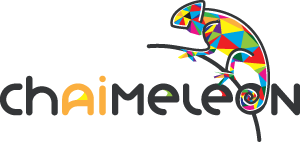
CHAIMELEON aims to set up a structured repository for health imaging data to be openly reused in Artificial Intelligence (AI) experimentation for cancer management. An EU-wide repository will be built as a distributed infrastructure and populated with multimodality imaging and related clinical data for historic and newly diagnosed lung, prostate and colorectal cancer patients.
The CHAIMELEON repository will be designed to meet the need for access to large datasets of high quality in interoperable repositories enabling secure sharing across Europe with the specific purpose of constituting an open, accessible, intuitive resource for the community of developers of AI-based solutions for cancer management. A multimodal analytical data engine will facilitate interpretation, extraction, and exploitation of the stored information. In a comprehensive validation phase, the partners will ensure the usability and performance of the repository as a tool fostering AI experimentation.
The project brings together public and private organisations from across Europe to perform collaborative research and development. The interdisciplinary CHAIMELEON consortium is made up of 18 partners from 10 countries and constitutes a pan-European ecosystem of knowledge, infrastructures, biobanks and technologies on oncology, AI/in-silico and cloud computing addressed to health. CHAIMELEON kicked off in September 2020 and will run until August 2024. EIBIR leads the project’s dissemination efforts.
For more information, visit the project’s website at chaimeleon.eu.
This project has received €8,784,038.75 in funding from the European Union’s Horizon 2020 research and innovation programme under grant agreement No 952172 and is active until August 31, 2024.
The EuCanImage project
A European Cancer Image Platform Linked to Biological and Health Data for Next-
Generation Artificial Intelligence and Precision Medicine in Oncology

The goal of EuCanImage is to build a highly secure, federated and large-scale European cancer imaging platform, with capabilities that will greatly enhance the potential of artificial intelligence (AI) in oncology. The platform will be populated with a completely new data resource (over 25,000 single subjects), which will allow to investigate unmet clinical needs like such as for the detection of small liver lesions and metastases of colorectal cancer, or for estimating molecular subtypes of breast tumours and pathological complete response. The platform will be cross-linked to biological and health repositories through the European Genome-phenome Archive, allowing to develop multi-scale AI solutions that integrate organ-level, molecular and other clinical predictors into dense patient specific cancer fingerprints. The project is coordinated by Karim Lekadir (University of Barcelona, ES) and EIBIR leads communication and outreach activities. The consortium will build upon several key European initiatives in data sharing for personalised medicine research, including EUCANCAN (cancer genomics and health data sharing), euCanSHare (cardiac imaging and omics data sharing) and EUCAN-Connect (federated data analytics) as well as the Cancer Imaging Archive (TCIA), the US cancer imaging repository.
For more information, visit the project’s website at eucanimage.eu.
This project has received €9,994,358.50 in funding from the European Union’s Horizon 2020 research and innovation programme under grant agreement No 952103 and is active until September 30, 2024.
The EURAMED rocc-n-roll project
European medical application and radiation protection concept: strategic research agenda and roadmap interlinking to health and digitisation aspects

The 3-year EURAMED rocc-n-roll project will produce a strategic research agenda in the field of medical radiation protection based on wide stakeholder input and consultation, a corresponding roadmap, and an interlink document, integrating the views and identifying synergies from the areas of radiation protection, health research and digitization with impactful guidance to the EC and stakeholders on future research.
A fully integrated and coordinated European approach based on stakeholder consensus and existing activities in the field will be ensured. The EURAMED rocc-n-roll consortium brings together relevant disciplines including radiation biology, dosimetry for medical applications, ethics, and clinical expertise, complemented by regulatory and health policy, AI, and industry experts.
EURAMED rocc-n-roll will analyse research and radiation protection needs in the clinical disciplines using ionising radiation with the aim to generate the largest benefit for the European population in an equal, safe, high-quality way throughout Europe by fostering clinical translation while also strengthening economic growth and industrial competitiveness supported by medical radiation protection research and innovation. Moreover, education and training schemes for health workforce and scientists will be developed to increase Europe’s research capacity in the field.
The EURAMED rocc-n-roll consortium brings together 29 partners from 17 European countries and includes representation of relevant radiation protection disciplines, ethics, clinical, regulatory and health policy, AI, and industrial expertise. This multidisciplinary and integrative approach will enable a broader framework of quality and safety in healthcare. The project is coordinated by EIBIR and runs from September 2020 to August 2023.
For more information, visit the project’s website at eucanimage.eu.
This project has received €1,959,175.00 in funding from the Euratom research and training programme 2019-2020 under grant agreement No 899995, and is active until August 31, 2023.
The SINFONIA project
Radiation risk appraisal for detrimental effects from medical exposure during management of patients with lymphoma or brain tumour

The 4-year SINFONIA project will develop novel methodologies and tools that will provide a comprehensive a risk appraisal for detrimental effects of radiation exposure on patients, workers, carers and comforters, the public and the environment during the management of patients suspected or diagnosed with lymphoma and brain tumours. The project started in September 2020. The multidisciplinary project consortium combines the expertise of 14 partners from 8 countries. It includes major universities, research institutes, hospitals and industry partners. A data repository will be developed for storing data as well as for the deployment of AI algorithms on an online platform. SINFONIA research outcomes for the two clinical examples, lymphoma and brain tumours, will be also applicable to other diseases. AI-powered personalised dosimetry tools will provide advanced knowledge on parameters affecting radiation detriment. This will help balancing risks and benefits of ionising radiation procedures and developing dose optimisation strategies. SINFONIA also will organise high level multidisciplinary training in the field of radiation dosimetry, risk appraisal and radiation protection and develop decommendations on radiological protection. The project is coordinated by EIBIR with Prof. John Damilakis (University of Crete) acting as Scientific Coordinator.
For more information, visit the project’s website at sinfonia-appraisal.eu.
This project has received €5,999,997.50 in funding from the Euratom research and training programme 2019-2020 under grant agreement No 945196 and is active until August 31, 2024.
Clinical studies
EIBIR currently provides its support to two industry-funded multi-centre clinical studies:
- The MIPA study, led by the University of Milan and funded by Bayer, is investigating pre-operative breast MRI for breast cancer and recently finished its patient enrolment.
- The SPECIFIC study is investigating myocardial perfusion imaging using perfusion CT and is funded by Siemens and Bayer, with Erasmus Medical Center and University Hospital Tübingen serving as the scientific leads.
Electronic Data Capture Platform
EIBIR launched its Electronic Data Capture platform in 2018. This platform can be used to collect and manage almost any type of digital data which is part of a clinical study, including DICOM images. The platform uses a secure web application for building and managing study databases with great flexibility and ease-of-use. EIBIR can also assist in setting up the data collection forms for your study.
EIBIR’s Electronic Data Capture Platform allows its network members to collect a wide range of research data for their studies in an easy-to-use system. Among others, the platform is currently in use by the EUCLID project, a European Commission Tender project on clinical diagnostic reference levels for x-ray medical imaging led by the ESR, and a large multi-centre study on a machine learning CT-derived FFR application under the lead of Erasmus Medical Center.
The MIPA study
Multicenter International Prospective Meta-Analysis of Individual Woman Data
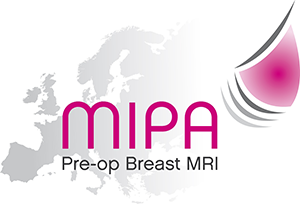
The MIPA study is led by EIBIR and Prof. Francesco Sardanelli (University of Milan, Italy). The study conducts a systematic evaluation of pre-operative breast MRI, examining individual patient data in a multi-centre setting with the aim of clarifying matters regarding the ongoing uncertainty in the application of pre-operative MRI in breast cancer patients.
In 2020, the investigators focused on the analysis of the collected data. The MIPA protocol was published and a paper on the main results based on the data of 5,204 analysed patients is currently in preparation. The MIPA results will significantly increase the understanding of the effect pre-operative breast MRI has on clinical decision-making.
EIBIR acts as the contracting partner for all participating centres in the MIPA study provides management and administrative support and handles all finances and leading dissemination efforts.
The SPECIFIC Study
Dynamic Stress Perfusion CT for Detection of Inducible Myocardial Ischemia
 The SPECIFIC study is an international clinical study investigating myocardial perfusion imaging, which is funded by Siemens and Bayer with Erasmus University Medical Center (Rotterdam, the Netherlands) as the study sponsor, and the University Hospital Tübingen as co-sponsor. Cardiac CT provides accurate assessment of the coronary arteries and detects significant coronary stenosis with high diagnostic accuracy. This information is highly relevant, but ignores the haemodynamic relevance of lesions detected this way, which is essential for clinical decision-making. The recent development of third-generation, dual-source CT allows for the assessment of myocardial perfusion, and may determine the haemodynamic relevance of coronary lesions. The objective of the SPECIFIC study is to determine the diagnostic accuracy of CT myocardial perfusion imaging for the detection of haemodynamically relevant coronary stenosis, as determined by invasive fractional flow reserve as a reference standard in patients with suspected or known coronary artery disease who have been clinically referred for invasive angiography. SPECIFIC is investigating the feasibility of this approach through an international multi-centre study with recruitment in the Netherlands, Germany, Poland, Switzerland, Japan and the United States.
The SPECIFIC study is an international clinical study investigating myocardial perfusion imaging, which is funded by Siemens and Bayer with Erasmus University Medical Center (Rotterdam, the Netherlands) as the study sponsor, and the University Hospital Tübingen as co-sponsor. Cardiac CT provides accurate assessment of the coronary arteries and detects significant coronary stenosis with high diagnostic accuracy. This information is highly relevant, but ignores the haemodynamic relevance of lesions detected this way, which is essential for clinical decision-making. The recent development of third-generation, dual-source CT allows for the assessment of myocardial perfusion, and may determine the haemodynamic relevance of coronary lesions. The objective of the SPECIFIC study is to determine the diagnostic accuracy of CT myocardial perfusion imaging for the detection of haemodynamically relevant coronary stenosis, as determined by invasive fractional flow reserve as a reference standard in patients with suspected or known coronary artery disease who have been clinically referred for invasive angiography. SPECIFIC is investigating the feasibility of this approach through an international multi-centre study with recruitment in the Netherlands, Germany, Poland, Switzerland, Japan and the United States.
In 2020, the data analysis was being performed. Publication of results is expected in 2021.
Within SPECIFIC, EIBIR provides management and administrative support, handles financial matters between the study and participating sites, as well as dissemination of the study results through well-established channels such as the European Society for Radiology. Additionally, EIBIR monitors the electronic case report forms for the study.
Financial report
EIBIR’s activities are financed by a number of sources, including Network and Industry Panel service package fees, support from the European Society of Radiology (ESR) and the shareholder organisations as well as EC funding for European research projects coordinated or supported by EIBIR and EIBIR project-related services provided to institutions against a fee.
A detailed annual financial report is presented to and approved by the shareholder organisations at the annual General Meeting, usually held during the European Congress of Radiology in Vienna.
At the EIBIR General Meeting held online on March 13, 2020, the financial report was approved;
| Approved financial report for 2019 | |
| Total income | €821,835.34 |
| Total expenditure | €801,819,82 |
| Operating profit | €20,015.52 |
| Total equity | €722,047.75 |
Do you have a great idea for research and are you planning to apply for funding?
We offer expert advice on proposal preparation and our Scientific Advisory Board, with 38 scientists from all over Europe, can provide critical and highly valuable feedback on your research proposal.
Our proposal preparation and project management team have experience and a proven track record in applying for EU funding and managing projects, starting with FP6 all the way to the highly competitive Horizon 2020 programme.
We are a non-profit organisation dedicated to helping scientists from all fields realise their research ideas while promoting the role of biomedical imaging research. You can benefit from our support services by subscribing to a service package and becoming part of the EIBIR Network at a competitive price. For proposal preparation support only, we offer alternative pricing options including a small success fee.
Here’s how EIBIR can help:
- During project preparation and application:
- Call-specific templates with detailed descriptions and input requirements
- Advice on project governance, management and work package structure, as well as consortium building
- Experienced advice and support on the crucial impact section of your proposal
- Critical reading and feedback from a team of experienced scientific writers with knowledge of European Commission requirements
- During the project:
- Project coordination and management, incl. financial and contractual activities, day-to-day management, meeting logistics, and quality assurance
- Communication and dissemination activities
Find out more about our services and get in touch with the EIBIR office to tell us about your proposal to see how we can help make your research idea a reality!
